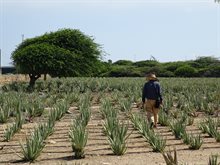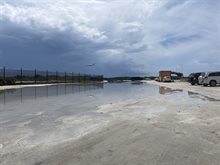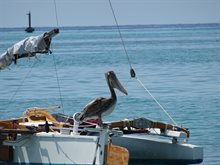What are the consequences for islanders?
Climate change may have a major impact on the islanders in the Caribbean region, not only in terms of their health, but also with respect to roads and buildings. In addition, economic sectors such as tourism, fisheries, and agriculture may sustain substantial damage. The potential consequences for each domain are outlined below.

Stories about islanders
On KlimaKòrsou and the Climate Impact Atlas Aruba you can read stories about how climate change is impacting Curaçao and Aruba. The stories about Curaçao were written by the Curaçao writer Tyson Hill. And the Aruban writer Rosabelle Illes wrote the stories about Aruba. From the perspectives of different residents, you will read about what climate change means for the islands. These stories are based on the most recent scientific knowledge.
Sectors
Health
Extreme downpours, storms, and tropical hurricanes may involve dangerous situations for residents, e.g., as a result of falling trees and damaged roads. Vital and vulnerable functions (in Dutch), e.g., hospitals and power plants, may also be jeopardised. In addition, heat can cause more health issues, heat stress, excess mortality, and an increase in pathogens. Examples include insects that can carry diseases, such as mosquitos that can transmit malaria or dengue.
Roads and buildings
Extreme weather poses a risk to the infrastructure of the Caribbean region. Roads and buildings may be damaged during tropical storms. Buildings such as hospitals, police stations, schools, houses, and resorts may be flooded as a result of the rising sea level. The port of Curaçao is also vulnerable to sea level rise. As extreme weather increases, repair costs will also increase. According to the report on Flood risk profiles of the BES islands (pdf, 3.9 MB), published in 2024, vital infrastructure on the islands of Saba and Sint Eustatius is prone to flooding as a result of the rising sea level and high waves caused by storm surges. Despite the steep coastline surrounding both islands, climate change may nonetheless have major consequences on account of this vulnerability. The lower lying part of Saba accommodates important infrastructure and buildings, such as the port and the drinking water company. The lower lying parts of Sint Eustatius contain several NuStar oil company facilities. Furthermore, important archaeological heritage sites, a number of hotels and restaurants, a petrol station, the electricity plant and the water plant (STUCO) are located on the coast.

Tourism
Tourism constitutes an important economic sector on all the Caribbean islands. Rising sea temperatures cause coral bleaching and ocean acidification, which is bad for diving tourism. Increasing heat may also affect the islands’ tourist appeal. Resorts are vulnerable, as they are located on sandy beaches. As a result of the rising sea level, sandy beaches may become increasingly smaller and even disappear altogether. According to the United Nations, a 1-metre sea level rise could partially or fully flood nearly thirty per cent of all resorts. Furthermore, climate change jeopardises cultural heritage. In the south of Bonaire, for example, slave cabins – protected monuments from the island’s slavery past – are under threat.

Fisheries
Climate change directly impacts the fishing industry, which is of major cultural and economic significance. A combination of deteriorating water quality, disappearing fish species, and shrinking coral may seriously harm fisheries. This will have consequences for food availability and for the economy. The documentary “Piskadó pa semper” on YouTube outlines the challenges faced by Bonaire fishermen and shows how they are joining forces to protect local fisheries. The documentary is the product of collaboration between SKAL (Bonaire museum), the World Wildlife Fund and the FuHiKuBo foundation.
Agriculture
The agricultural sector may sustain damage from increasing periods of heat and drought, and from soil salinisation. Seawater flowing increasingly inland during extreme weather may compromise freshwater availability. This combination of factors can affect food production.
Want to read more?
The section below lists examples of publications, studies, and projects relating to the consequences of climate change for residents of the Caribbean part of the Kingdom of the Netherlands.
- The report entitled Climate Change Effects & Recommendations by the Dutch Caribbean Nature Alliance (DCNA) contains an extensive overview of the impact of climate change on the Caribbean region. The report delves into the impact on nature and the socio-economic effects. It also presents recommendations for adaptation measures at various scale levels.
- The study entitled The impacts of climate change on Bonaire (2022-2023), conducted by VU Amsterdam university, provides an analysis of the consequences of climate change for Bonaire. Among other things, the study examines the risks of coastal flooding as well as potential consequences for the economy, for cultural heritage, and for public health.
- The 2022 IPCC fact sheet outlines the various consequences and risks of climate change for small islands in the Caribbean region, the Pacific, and the Indian Ocean. The fact sheet also provides information on potential climate adaptation measures and on issues that may hamper climate adaptation on small islands.
- The report entitled Small Islands – Large climate change challenges, published by the Dutch Caribbean Nature Alliance (DCNA) in 2022, outlines the climate change impacts that may affect families on Bonaire and presents policy recommendations to help families to better prepare.
- The Klimaatalarm voor Bonaire (Bonaire Climate Alert) edition of Bon Bini Bonaire magazine deals with the consequences of climate change for the residents and nature of Bonaire, and outlines potential measures.
- The final report Integrated Water Management on Bonaire by the Rijn & IJssel Water Board outlines potential short-term and long-term solutions and measures to enhance the climate resilience of the Bonaire water system.
- The report entitled (pdf, 2.9 MB)Climate Impacts on Aruba (pdf, 2.9 MB)outlines the potential main impacts on the island of Aruba. The report is the result of a stakeholders' workshop held in January 2025, organised by the National Climate Resilience Council Aruba (NCRC), the Ministry of Transport, Integrity, Nature en Elderly Affairs, the International Panel on Deltas and Coastal Areas (IPDC) and Climate Adaptation Services (CAS).
-
The report entitled Klimaateffecten op Curaçao [Climate Impacts for Curaçao] outlines the potential main impacts of climate change on the island of Curaçao. The report is the result of a stakeholders’ workshop held in the autumn of 2023, organised by the Island(er)s at the Helm programme, NAAM, EcoVision N.V. and Climate Adaptation Services (CAS).
-
The report entitled Climate Impacts for Bonaire outlines the potential main impacts of climate change on the island of Bonaire. The report is the result of a stakeholders’ workshop held in the autumn of 2023, organised by TERRAMAR, Island(er)s at the Helm, Climate Adaptation Services (CAS), the Royal Netherlands Meteorological Institute (KNMI) and Wageningen University & Research (WUR).